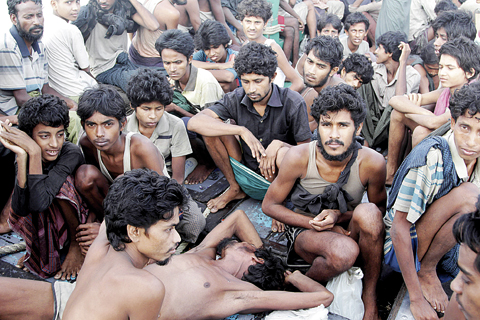YANGON: At least 65,000 Rohingya have fled to Bangladesh from Myanmar-a third of them over the past week-since the army launched a crackdown in the north of Rakhine state, the UN said yesterday. The figure marks a sharp escalation in the numbers fleeing a military campaign which rights groups say has been marred by abuses so severe they could amount to crimes against humanity.
They also come the same day the UN's human rights envoy for Myanmar, Yanghee Lee, began a 12-day visit to probe violence in the country's borderlands that will take her to the army-controlled area. "Over the past week, 22,000 new arrivals were reported to have crossed the border from Rakhine state," the UN's relief agency said in its weekly report.
"As of 5 January, an estimated 65,000 people are residing in registered camps, makeshift settlements and host communities in Cox's Bazaar" in southern Bangladesh, said the Office for the Coordination of Humanitarian Affairs. The exodus of Rohingya from northern Rakhine began after Myanmar's army launched clearance operations while searching for insurgents behind deadly raids on police border posts three months ago.
Escapees from the persecuted Muslim minority in Bangladesh have given harrowing accounts of security forces committing mass rape, murder and arson.
The stories have cast a pall over the young government of Aung San Suu Kyi, with mainly Muslim Malaysia being especially critical. Myanmar's government has said the claims of abuse are fabricated and launched a special commission to investigate the allegations.
Last week it presented its interim report denying accusations of "genocide and religious persecution" and saying there was insufficient evidence that troops had been committing rape. That judgement came days after a video emerged showing police beating Rohingya civilians, something the government said was an isolated incident after the officers were arrested.
On Monday the UN's Lee began her own probe with a visit to Kachin state, where thousands have been displaced by fighting between ethnic rebels and the army. Lee, who has faced threats and demonstrations on previous visits over her comments on Myanmar's treatment of the Rohingya, is due to visit Rakhine before leaving on January 20.
"The events of the last few months have shown that the international community must remain vigilant in monitoring the human rights situation," in Myanmar, Lee, the UN special rapporteur on human rights in Myanmar, said in the statement. Suu Kyi, a former political prisoner and champion of democracy in the then military-ruled Myanmar, came to power in April after a landslide election win, installing her confidant, Htin Kyaw, as president.
However, increasing violence in border regions has raised questions about Suu Kyi's commitment to human rights and ability to rein in the military, which retains a major political role.
The government has restricted aid to northern Rakhine State, where most people are Rohingya Muslims denied citizenship in Myanmar, and prevented independent journalists from visiting. Muslim-majority Malaysia and Indonesia, which has the world's biggest Muslim population, have raised concern over the Rakhine crisis, which security officials believe is attracting the attention of international militant groups.
Lee will also investigate the impact on civilians of intensified fighting between the army and rebels in Kachin and Shan states, which she said "is causing some disquiet regarding the direction that the new government is taking in its first year of administration". Aye Win, UN spokesman in Myanmar, said Lee had arrived in Myanmar late on Sunday and was due to fly to the Kachin State capital of Myitkyina yesterday. Presidential spokesman Zaw Htay said the government would provide Lee with security to visit conflict areas. -Agencies











